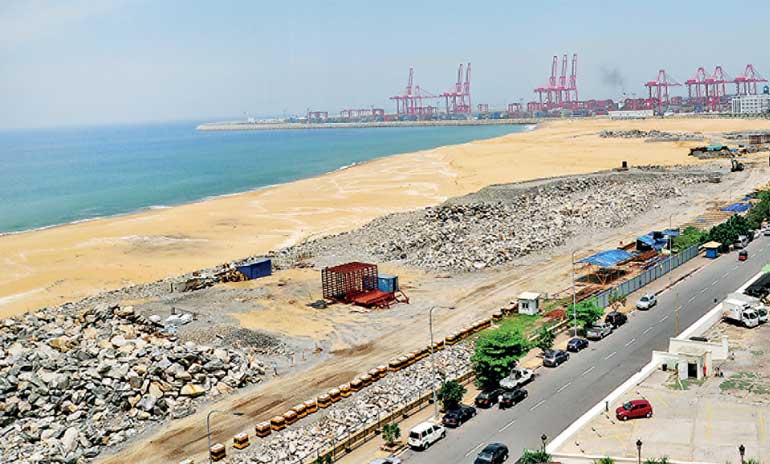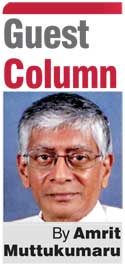Sunday Feb 22, 2026
Sunday Feb 22, 2026
Tuesday, 20 September 2016 00:01 - - {{hitsCtrl.values.hits}}
The controversial Chinese funded ‘Colombo Port City’ project has been re-christened also without public consultation as ‘Colombo International Financial City’ to establish an offshore financial centre as the centrepiece of the re-claimed land adjoining the Galle Face Green. It is said to “fill the vacuum between Singapore and Dubai” and touted as a “major income earner and an employment provider for Sri Lanka”.
This is all well and good if the country like Singapore has a pool of competent legislators and civil servants with integrity and a track record of adherence to the rule of law. Sadly there is no comparison. Of course Sri Lanka scores on democratic values which are dwindling.
The lack of transparency in responding to public concerns on environmental, land alienation, land use and employment issues is not the focus of this article. Its focus is on the integrity of the ‘Colombo International Financial City’ which is dependent on the political will to have and comply with internationally accepted accounting/financial standards and regulations.
If there is any breakdown or compromise as is the wont in this country, the ‘Financial City’ may end up as a hub for money laundering by drug dealers, arms dealers, the mafia, politically induced corruption and as a source of terror funding.
 Given the political and socio-economic ground reality of present day Sri Lanka, it is difficult to envisage an ethical and transparent ‘Colombo International Financial City’ respecting the rule of law
Given the political and socio-economic ground reality of present day Sri Lanka, it is difficult to envisage an ethical and transparent ‘Colombo International Financial City’ respecting the rule of law
Examples galore under successive administrations of there being no political will for transparency in governance and upholding the rule of law particularly since then President J.R. Jayewardene in the post 1977 period is said to have issued the invitation – “Let the robber barons come!”
In the area of financial services under the present Yahapalanaya government there is no better example than the alleged Central Bank Treasury Bond scams which are still festering and the failure of the new Governor to restore the battered credibility of the CB through a transparent in-house investigation to determine whether due process was breached and by whom.
Other examples under Yahapalanaya include (i) credible allegation of the shameful attempt by a Cabinet sub-committee to make the ‘National Audit Bill’ ineffective by the removal of some key provisions (ii) farcical ‘Constitutional Council’ for good governance where seven of its 10 members are politicians. The purported ‘independent’ commissions are established under it and the CC recommends appointments to key State institutions which include the Judiciary.
There is also no political will to get to the root of credible allegations of financial and other crimes under the Rajapaksa administration and hold those concerned truly accountable. This is most likely a continuation of “You scratch my back and I’ll scratch yours” syndrome which is a feature in this country not necessarily confined to politicians. Any deviation from this practice will most likely be for political or pecuniary expediency.
Under the circumstances, is it reasonable to expect the ‘Financial City’ to be administered with integrity?
If frequent detections of large quantities of illegally-trafficked drugs such as heroin on the high seas is the tip of the iceberg, Sri Lanka may well be on the way to becoming a regional hub for illicit drugs. There are allegations of a nexus between drug dealers and politicians. Stories doing the rounds of widespread corruption in the customs establishment in the context of the alleged extravagant lifestyles of many customs officers does nothing to allay the fears one may have in the integrity of the proposed ‘Financial City’.
Although not much is heard today of the proposed setting up of large casinos initiated during the Rajapaksa administration, the  public are all at sea on the actual position under the current Yahapalanaya Government. The rate at which the Sirisena-Wickremesinghe administration are resurrecting Rajapaksa initiated projects which they condemned in the run-up to the elections, the country may also be on the verge of becoming a regional casino hub with all its likely implications for money laundering and mafia activities.
public are all at sea on the actual position under the current Yahapalanaya Government. The rate at which the Sirisena-Wickremesinghe administration are resurrecting Rajapaksa initiated projects which they condemned in the run-up to the elections, the country may also be on the verge of becoming a regional casino hub with all its likely implications for money laundering and mafia activities.
It is possible that the feasibility of some major property development investments in the heart of Colombo is dependent on the establishment of large casinos. The writer is not stating that establishing casinos per se is all bad. In this day and age it can be argued it is inevitable particularly if tourism is going to be a major contributor to the economy. What needs to be flagged is that there must be appropriate laws and regulations which are enforced and zero tolerance of corrupt practices. Is this likely in the Sri Lanka of today? Will the Government shed clarity on this issue?
Much controversy also surrounds the legality or otherwise of the activities of Avant-Garde Maritime Services Ltd. said to be operating a floating armoury on the high seas and alleged to be engaged in money laundering. The Government claims it has led to the country incurring a loss in excess of Rs. 11 Billion. Confusion is worse confounded after two senior Cabinet ministers in the Yahapalanaya government allegedly defended Avant-Garde after which one of them resigned.
This is the ground reality in a country that proposes to have an ‘International Financial City’ to function as an offshore international financial centre.
Given the political and socio-economic ground reality of present day Sri Lanka, it is difficult to envisage an ethical and transparent ‘Colombo International Financial City’ respecting the rule of law. A major impediment are influential sections of our professionals – particularly Chartered Accountants/Auditors and lawyers.
I state with responsibility that CA Sri Lanka (Institute of Chartered Accountants of Sri Lanka) which regulates the country’s chartered accountants and auditors is corrupt. After all, chartered accountants and auditors are the first line of defence against corruption in all entities dealing with financial resources.
I ask, could the alleged terrible corruption and abuse of power under the Rajapaksa administration have taken place without the complicity of professionals and business leaders?
Let me emphasise – this by no means exonerates wrongdoing by politicians. They must be held accountable for their command responsibility.
The integrity of CA Sri Lanka is heavily compromised due to its shameful conduct after my complaint made as far back as 8 August 2005 of professional misconduct by the Sri Lankan affiliates of PwC and Ernst & Young in the fraudulent privatisation of the Sri Lanka Insurance Corporation (SLIC). To date it has not concluded its investigation, has reneged on its undertakings given to me and kept me the complainant in the dark. This is notwithstanding several written reminders.
The undertakings include:
(i) “to complete the investigation early and transparently.” (Ref. e-mail of 13 March 2006)
(ii) “After investigation is completed you will be informed of the determination.” (Ref. e-mail of 18 March 2006)
(iii) “The rationale for the determination would be given” (Ref. e-mail of 18 March 2006)
Notwithstanding these written undertakings, I was informed by Secretary, CA Sri Lanka in his
‘Registered’ letter dated 3 August 2016 marked ‘Confidential’:
“The Council has directed me to inform that the Council appointed committees to inquire into your complaint and the proceedings of the said inquiries are now concluded.
Therefore, we wish to inform you that this matter is now closed.”
Does this not confirm CA Sri Lanka corruption? It is appalling that CA Sri Lanka keeps a major public interest issue ‘Confidential’!
While PwC (Indonesia & Sri Lanka) functioned as Consultant, Investment Banking and Legal Advisory Services to the Government of Sri Lanka, Ernst & Young (Sri Lanka) were the Auditors to SLIC.
In the context of all ‘Partners’ under the ‘Partnership’ law in Sri Lanka being ‘Jointly and severally’ liable for any wrongdoing, my demand that CA Sri Lanka:
“forthwith discloses in the public domain the identity of those who were ‘Partners’ of PwC and EY for five years prior to 11 April 2003 which is the date on which the scandalous SLIC privatisation took place” has been ignored.
It is outrageous that some Partners falling under this period are appointed directors of quoted companies and banks. Some have even been appointed to the Quality Assurance Board of CA Sri Lanka!
It is baffling why even those purportedly battling corruption such as Friday Forum and its convener – Chandra Jayaratne, Transparency International Sri Lanka and its leading light – J.C. Weliamuna, Citizens’ Movement for Good Governance and its President – Dr. A.C. Visvalingam steer clear of naming and shaming and demanding accountability from the Partners concerned of PwC and Ernst & Young faulted for grave professional misconduct by the Supreme Court, Parliament’s watchdog COPE, the Attorney-General and CA Sri Lanka’s Ethics Committee itself in the scandalous SLIC privatisation.
It is in this context that unbridled corruption flourishes with impunity.
An article in ‘The Guardian’ titled ‘Dubai›s dark side targeted by international finance police’ inter alia alleges:
“Fears are intensifying that the emirate has become a global centre for terror funding, money-laundering, drug money and mafia cash”
“United Arab Emirates is not so much awash with vast oil wealth but built on a toxic tide of illicit cash: a place where Russian mafia and drug cartels clean their dirty cash and alQaida finances terror atrocities. And at its heart is Dubai, a world financial centre”
Will the same be true of the ‘Colombo International Financial City’?